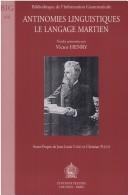| Listing 1 - 7 of 7 |
Sort by
|
Book
ISBN: 9782251443997 2251443991 Year: 2010 Publisher: Paris Les Belles Lettres
Abstract | Keywords | Export | Availability | Bookmark
 Loading...
Loading...Choose an application
- Reference Manager
- EndNote
- RefWorks (Direct export to RefWorks)
Imaginary languages --- Languages, Artificial --- Artificial languages --- Interlinguistics --- Language, Universal --- Language planning --- English language --- Language, Imaginary --- Language and languages --- Languages, Imaginary --- French --- Imaginary histories --- Errors, inventions, etc.

ISBN: 2020067137 9782020067133 Year: 1984 Publisher: Paris Editions du Seuil
Abstract | Keywords | Export | Availability | Bookmark
 Loading...
Loading...Choose an application
- Reference Manager
- EndNote
- RefWorks (Direct export to RefWorks)
Artificial languages --- Imaginary languages --- Language and languages --- Languages, Artificial --- Langues imaginaires --- Langage et langues --- Langues artificielles --- Interlinguistics --- Language, Universal --- Language planning --- Foreign languages --- Languages --- Anthropology --- Communication --- Ethnology --- Information theory --- Meaning (Psychology) --- Philology --- Linguistics --- English language --- Language, Imaginary --- Languages, Imaginary --- Imaginary histories --- Errors, inventions, etc. --- Imaginary languages. --- Language and languages. --- Languages, Artificial.
Book
ISBN: 9782503549453 2503549454 Year: 2013 Volume: 162 Publisher: Turnhout: Brepols,
Abstract | Keywords | Export | Availability | Bookmark
 Loading...
Loading...Choose an application
- Reference Manager
- EndNote
- RefWorks (Direct export to RefWorks)
Qui veut comprendre la magie antique, les sociétés et cultures qui s’y rattachent, qui veut aller au-delà des apparences et des clichés, rencontre nécessairement les noms « barbares », dits aussi noms mystiques ou inintelligibles. Leur finalité première est d’opérer des prodiges par l’efficacité attribuée aux énoncés de noms divins. Peu de gens ont vu les prodiges, mais tout le monde connaît au moins quelqu’un qui les a vus : qu’il s’agisse d’apparitions de divinités, d’animaux qui parlent ou encore d’humains entrant dans la vie de l’univers. Aucune de ces opérations ne s’effectue sans noms barbares.Pour la première fois, un ouvrage tente de comprendre le rôle et les mécanismes des noms barbares comme magie de nommer. Ils sont l’objet magique par excellence, fait de jeux de signes et de phonèmes, de transferts d’un panthéon à l’autre et de fusions des dynasties divines. Invoquer ses propres dieux dans un langage étrange, par des raccourcis phonétiques ou bien en utilisant les noms et épithètes des dieux des autres est le trait distinctif de la magie et de ses professionnels, de l’Orient gréco‑sémitique à l’Occident latin.
Magic, Ancient --- Magie ancienne --- Imaginary languages --- Theurgy --- Incantations --- 133.4 --- Spells --- Magic --- Rites and ceremonies --- English language --- Language, Imaginary --- Language and languages --- Languages, Imaginary --- Languages, Artificial --- Religious aspects --- Etymology --- Names --- History. --- Occulte werking. Magie. Toverij --- Imaginary histories --- Errors, inventions, etc. --- History --- 133.4 Occulte werking. Magie. Toverij --- Magic [Ancient ] --- Congresses

ISBN: 9042908327 2877234797 Year: 2001 Volume: 44 Publisher: Leuven : Editions Peeters,
Abstract | Keywords | Export | Availability | Bookmark
 Loading...
Loading...Choose an application
- Reference Manager
- EndNote
- RefWorks (Direct export to RefWorks)
Imaginary languages --- Language, Imaginary --- Languages, Imaginary --- Imaginary histories --- Language and languages --- 804.0 <09> --- Foreign languages --- Languages --- Anthropology --- Communication --- Ethnology --- Information theory --- Meaning (Psychology) --- Philology --- Linguistics --- English language --- Languages, Artificial --- 804.0 <09> Frans. Franse taalkunde--Geschiedenis van ... --- Frans. Franse taalkunde--Geschiedenis van ... --- Frans. Franse taalkunde--Geschiedenis van .. --- Errors, inventions, etc. --- Frans. Franse taalkunde--Geschiedenis van . --- Frans. Franse taalkunde--Geschiedenis van
Book
ISBN: 3893233032 Year: 1987 Volume: 3 Publisher: Münster Nodus
Abstract | Keywords | Export | Availability | Bookmark
 Loading...
Loading...Choose an application
- Reference Manager
- EndNote
- RefWorks (Direct export to RefWorks)
Language, Universal --- Language and languages --- Langue universelle --- Langage et langues --- Philosophy --- Philosophie --- Leibniz, Gottfried Wilhelm, --- 1 LEIBNIZ, GOTTFRIED WILHELM --- Imaginary languages --- -Language, Universal --- Interlinguistics --- International language --- Language, International --- Language, World --- Universal language --- World language --- Foreign languages --- Languages --- Anthropology --- Communication --- Ethnology --- Information theory --- Meaning (Psychology) --- Philology --- Linguistics --- English language --- Language, Imaginary --- Languages, Imaginary --- Languages, Artificial --- Filosofie. Psychologie--LEIBNIZ, GOTTFRIED WILHELM --- Imaginary histories --- Errors, inventions, etc. --- Leibniz, Gottfried wilhelm Freiherr von --- -Contributions in concept of subjectivity --- -Congresses --- 1 LEIBNIZ, GOTTFRIED WILHELM Filosofie. Psychologie--LEIBNIZ, GOTTFRIED WILHELM --- Leibnitz, Gottfried Wilhelm --- Leibniz, Gottfried Wilhelm
Book
ISBN: 9780847842131 9788817013895 0847842134 Year: 2018 Publisher: New York Rizzoli
Abstract | Keywords | Export | Availability | Bookmark
 Loading...
Loading...Choose an application
- Reference Manager
- EndNote
- RefWorks (Direct export to RefWorks)
Imaginary languages. --- Imaginary societies --- Langues imaginaires --- Sociétés imaginaires --- Imaginary languages --- Encyclopedias and dictionaries --- 741.5.07 --- Books of knowledge --- Cyclopedias --- Dictionaries --- Encyclopedias and dictionaries, English --- Knowledge, Books of --- Subject dictionaries --- Reference books --- Fictitious societies --- Societies, Imaginary --- Societies --- English language --- Language, Imaginary --- Language and languages --- Languages, Imaginary --- Languages, Artificial --- Tekenkunst ; striptekenaars ; cartoonisten A - Z --- Imaginary histories --- Errors, inventions, etc. --- 741.07 --- Science Fiction Encyclopedia --- Fictieve ; imaginaire taal en alfabet --- Serafini, Luigi °1949 (°Rome, Italië) --- Tekenkunst ; tekenkunstenaars A - Z --- Beeldverhalen ; Codex Seraphinianus ; door L. Serafini ; 1981 --- Fictieve encyclopedieën ; imaginaire taal, alfabet en beelden
Book
ISSN: 01698028 ISBN: 9789004165533 9004165533 9786613060723 9047433084 1283060728 9789047433088 Year: 2008 Volume: Bd. 97 Publisher: Leiden Brill
Abstract | Keywords | Export | Availability | Bookmark
 Loading...
Loading...Choose an application
- Reference Manager
- EndNote
- RefWorks (Direct export to RefWorks)
The question of how pure spiritual beings like angels communicate had already been discussed by the Church Fathers. How could an angelic speech-act take place, if it does not follow the laws of ordinary language? The scholastic philosophers conducted an extensive and rather controversial debate about the language of angels ('locutio angelica'), which covered pragmatics, aspects of the 'Language of Mind' and the theory of truth and meaning. This debate was already very complex in the Middle Ages, but in Jesuit circles (and in Baroque Scholasticism more generally), discussions of angelic communication became a leading field of interest in the philosophy of language influencing such eminent thinkers as Leibniz. This study reconstructs the 1500 years of controversy on the language of angels as a striking example of the longue durée of European intellectual history.
Language and languages --- Angels. --- Imaginary languages. --- Philosophy, Medieval. --- Langage et langues --- Anges --- Langues imaginaires --- Philosophie médiévale --- Philosophy. --- Religious aspects --- Christianity. --- Philosophie --- Aspect religieux --- Christianisme --- Angels --- Imaginary languages --- Philosophy, Medieval --- Philosophy --- Christianity --- Language and languages -- Philosophy. --- Language and languages -- Religious aspects -- Christianity. --- Languages & Literatures --- Philology & Linguistics --- 235.1 --- 800.1 --- Medieval philosophy --- Scholasticism --- Christianity and language --- English language --- Language, Imaginary --- Languages, Imaginary --- Languages, Artificial --- Angelology --- Cherubim --- Cherubs (Spirits) --- Divine messengers --- Seraphim --- Spirits --- Goede engelen --- Taalfilosofie --- Imaginary histories --- Errors, inventions, etc. --- 800.1 Taalfilosofie --- 235.1 Goede engelen --- Philosophie médiévale --- Foreign languages --- Languages --- Anthropology --- Communication --- Ethnology --- Information theory --- Meaning (Psychology) --- Philology --- Linguistics --- Religious aspects&delete& --- Engelsprache. --- Scholastik. --- Sprechakt. --- Language and languages - Philosophy --- Language and languages - Religious aspects - Christianity
| Listing 1 - 7 of 7 |
Sort by
|

 Search
Search Feedback
Feedback About UniCat
About UniCat  Help
Help News
News